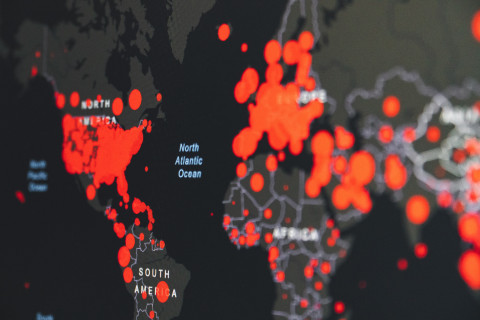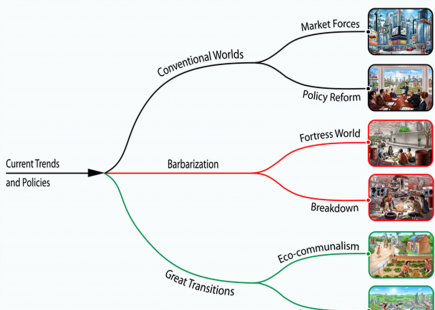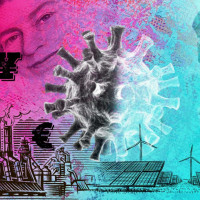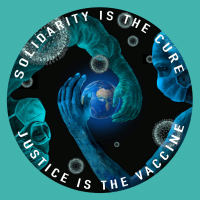Conventional Worlds is the first. If the current conjuncture marks a mere temporary acceleration of the market-driven stresses of the past three decades, both the national and international response to the pandemic, however imperfect, will eventually tame its worst repercussions and return the global body politic to its pre-pandemic conditions. Within this Conventional World are two variants: Market Forces and Policy Reform. In the parlance of current debates Market Forces most closely resembles the status quo and “return to normalcy” of societies dominated by individualism, consumerism and limitless growth. Extreme economic and social disparities and ecological degradation persist with minimal effort to reverse such trends. In the Policy Reform variant, some advancement in social safety nets and taming corporate power occur, along with limited embrace of planetary boundaries by political leaders, civil society and some corporations. But the will and resources to forcefully implement such reforms falter in the face of powerful vested interests that protect prevailing systems, leaving societies modestly better off compared to a Market Forces future.
Barbarization—with its two variants, Breakdown and Fortress World—constitutes the second post-pandemic scenario. This future envisions an acceleration of trends already underway, including those accentuated by COVID-19 such as an exacerbation of the wealth and health disparities and ecological degradation. In a Fortress World, the extant wave of autocratization—think Egypt, Syria, Turkey, Hungary, Philippines, Venezuela—intensifies as nations drift toward social control, xenophobia and nativism. The wealthy retreat to enclaves, and the poor become increasingly marginalized. In the Breakdown variant, the rule of law, basic civility and social cohesion collapse as competing forces lead to political stalemate and debasement of governmental institutions, in some cases leading to failed states. Afghanistan, Libya and Yemen demonstrate many attributes of the Breakdown scenario. In both forms of Barbarization, multilateralism suffers as the influence and resources of global organisations such as the WHO, WTO and ILO diminish in the face of rampant isolationism and disregard for international norms and accords pertaining to human rights, worker rights and the environment.
Great Transitions (GT), the third scenario, comprises two variants, Eco-Communalism and a New Paradigm rooted to deep and enduring planetary consciousness and practice. In Eco-Communalism, a “small-is-beautiful” ethos expands in both the global south and the global north, fueled by an anti-globalization vision of self-reliance and ecological sensibility. The New Paradigm variant allows space for such a world but within an inclusive, global cosmopolitanism in which planetary consciousness undergirds an upgrade of existing, and the creation of new, transnational governance institutions.[ii] This scenario embraces a worldview rooted in interconnectedness and recognition of ecosystems boundaries coupled with universally accepted norms that foster well-being, justice and solidarity.
Mixed Signals, One Choice
These scenarios are not forecasts but archetypes of plausible futures. Indeed, a scan of the global landscape today reveals features of all three. Both the blending and distinctiveness serve as instruments for stimulating and structuring debate among activists, enterprise, labor, government and other stakeholders.
In the context of the pandemic, the scenarios depict possibilities that will emerge from the disruption occasioned by COVID-19. The sudden onset of the pandemic and its rapid planetary expansion fueled by three waves of infection have claimed more than one million lives. With at least another year before universal vaccination is likely, the pandemic represents a crucible for foresight and preparedness for both national and multilateral institutions. With few exceptions, both have proven woefully inadequate as pre-pandemic conditions lead to disproportionate burdens on the poor and marginalized coupled with the enrichment of the already privileged.[iii]
Relative to other global crises, COVID-19 stands apart in terms of complexity and reach. The pandemic is a case of extreme multi-dimensionality, transcending the realms of economics, health, ecology and geopolitics to expose the higher-order, systemic failings of early twenty-first-century global capitalism. Beneath the immediate devastation lies the longstanding conditions that spurred its emergence and diffusion and hobbled national and international responses. As world leaders engage in superpower blame shifting (Trump), detachment (Putin) and elevated social control (Xi), the contagion continues to disrupt commerce and cooperation on a planet under stress.
In conformance with a Conventional Worlds scenario, governments are overwhelmingly relying on traditional monetary and fiscal interventions in response to escalating socio-economic stress. As unemployment rates surge and whole business sectors (tourism, aviation, traditional retail, logistics, higher education) struggle to endure, governments in advanced nations continue to seek a return of economies to pre-COVID normalcy without fundamental changes in the capital-labor relations that have exacerbated the pandemic’s impact.
COVID-19 has laid bare the fragility of social safety nets in the US, exposing millions of workers to loss of health insurance and millions worldwide to collapsing incomes and food insecurity. Nations without robust fiscal and monetary capacity in Latin America, Africa and South Asia face escalating stress. Rising unemployment and migration reflect the plummeting demand for commodity exports and fraying supply chains associated with plummeting global demand in many sectors. In short, the pandemic is stretching to the breaking point the capacity of policy reform to halt, much less reverse, growing economic and social disruption that fuel the drift toward barbarization.
Amidst the gloom, glimmers of a GT have emerged in multiple quarters. In the EU, early discussion of fiscal unity—a heretofore no-go zone—has emerged as countries collectively struggle to recover from the wreckage of the pandemic. The possibility of common debt, common taxes and a shared budget to support the recovery signals at least the possibility of a post-Brexit reset in the direction of supranationalism.
A rethinking of the definition of work and workers, especially the nature of “essential” work, is visible across academia, labor and civil society. Universal basic income and job guarantee policies, until recently at the fringe of mainstream policy debates, are moving to the center as the full effects of the pandemic become increasingly urgent. “Essential” work is undergoing major revisions as the lifesaving role of health professionals, homecare givers (including family members), grocery clerks, sanitation and a host of other under-recognized jobs are starting to attract recognition they deserve. A global consortium of some 5000 academics recently argued for a major shift toward “decommodification” of labor and workplace democratization in both ownership and control, the latter a longstanding goal of progressives now gradually shifting toward the mainstream.[iv]
As the complexity of the pandemic becomes increasingly evident, forecasting is fraught with uncertainty. From a GT perspective, this very complexity may prove to be an asset rather than an impediment to systemic change. Because of the intersectional nature of actors and impacts, COVID-19 signals an inflection point for mobilizing across boundaries and issues.
The time is ripe for a surge of such formations, powered by shared grievance, conscious of a rare conjuncture of events, and enabled by technology. Will we seize the moment?
Allen White is the Vice President and Senior Fellow of the Tellus Institute and the Co-Founder of the Global Reporting Initiative.
[ii]To illustrate how one sector—the corporate--might emerge in a Great Transition scenario, see White, Allen. (2019) ‘Corporations in the Crosshairs: From Reform to Redesign’, Great Transition Initiative. Available at https://greattransition.org/gti-forum/csr-white





